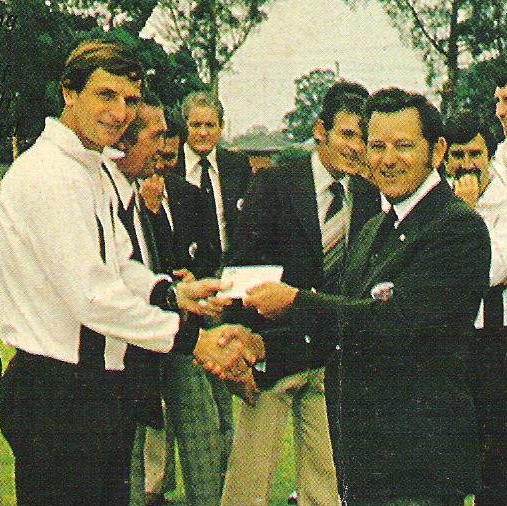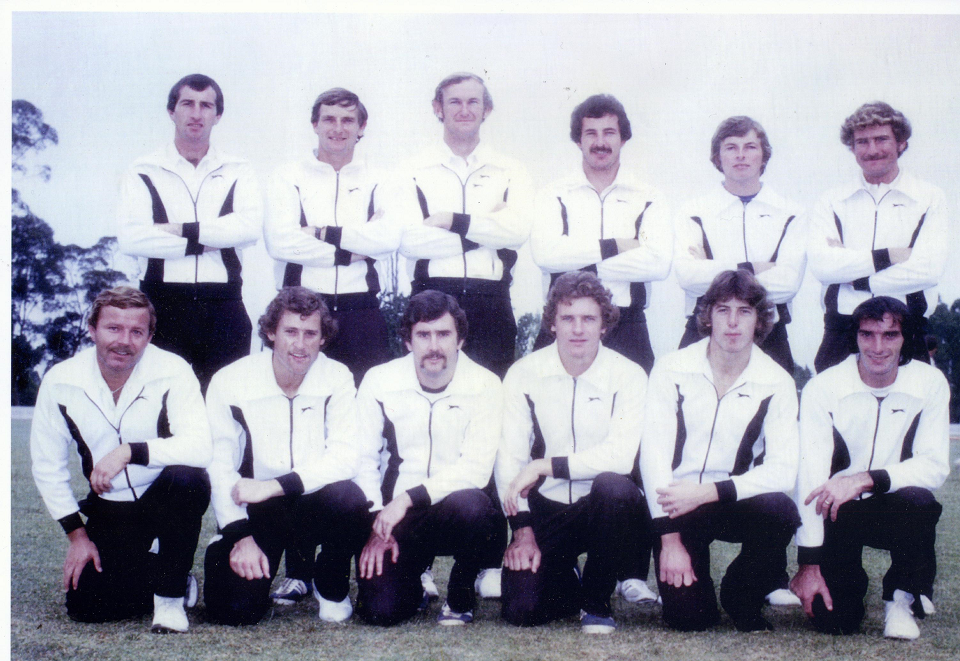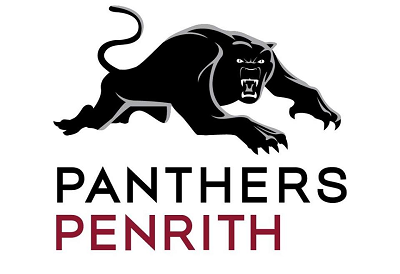Panther Power - Penrith Cricket Club First Premiership 1978-79
Penrith Cricket Club | November 22, 2023

This was a defining season in the Club’s young history, indeed a magical season! Four major events occurred:
- the Club changed its name from Nepean to the ‘Penrith District Cricket Club’;
- Penrith Rugby Leagues Club became our Major Sponsor;
- Penrith City Council agreed to an Annual Grant of $11,000 to allow the Club to improve and better maintain Howell Oval and Cook Park.
- the First grade won the Minor Premiership, then went on to win the Premiership!
It was the first occasion that any sporting team from the Penrith District had won a metropolitan First Grade Premiership in any sport. And, although many would place less weight on it, another factor instrumental in the turnaround was the formation of the Club’s first Ladies' Auxiliary. Its aims were: to assist the Cricket Club wherever possible; to generate interest in the game of cricket among the ladies. So, whenever the 1978/79 season is mentioned, think ‘milestone’.
The name change from Nepean to Penrith was directly tied into the sponsorship deal with the local Leagues Club. That sponsorship, and strong financial support from Sinclair Ford, put the Club on a more professional footing and allowed it to attract experienced players from the much stronger Bankstown Club to bolster our weaknesses and, at the same time, weaken Bankstown. The Council Grant allowed for the appointment of Peter Leroy, later the Sydney Cricket Ground Curator, to a full time role at Howell and the considerable improvement in the pitch played a role in the First Grade’s success.
The Firsts hit the lead in round four and were never headed. The team led at various times by 10 points, 16 points, 18 points, 19 points and won the Minor Premiership by 13 points. It won The Sydney Morning Herald Team of the Year and John Benaud won The SMH Captain of the Year. In his captain’s report Benaud said: “Personally, I found this a most taxing season, physically and mentally, but my most satisfying ever. I rate this team the finest bunch of triers I’ve had the good fortune to be with. They had nothing going for them—last season 17th. This season certainly we had the new, contracted players—top order batsman Steve Small, orthodox left-arm spinner Tony Radanovic and wicket-keeper Les Andrews. And two youngsters, David Laming and Graeme Thorpe began in Second Grade – my poor judgement. The rest you have known for a while now – local juniors and they have done it hard.”
So, from modest beginnings to First Grade Premiers in six seasons … an outstanding result and, in the main responsible for a sixth position finish in the Club Championship, our highest since inception.
Another pleasing feature of the season was the vastly improved Green Shield performance, with many of the boys products of the Club’s coaching program. One, Stuart Hogan, became the first Penrith player to be selected in the Combined A W Green Shield 1st XI to play Country.
The Club also achieved a celebrity status of sorts. Locally, the late Frank Ley’s Saturday morning sports program on 2KA had a cricket segment featuring Gary Donlan, whose quirky sense of humour, repartee and knowledge of the game proved highly entertaining and, as the season progressed, this was the magnet that attracted more and more fans to Howell. At Semi-final and Final time Frank arranged an open phone line to Howell for pre-match comment, progress scores and after-match comments.
Jim Maxwell in his mid-week and Saturday night ABC Sportsmen’s round up provided lengthy interviews with John Benaud pre-season and pre-Final. The Penrith Press and St Marys Star gave excellent coverage and the ‘Cinderella’ story even interested the Sydney press. The Sun carried an article on Penrith’s chances in the Semi-final against North Sydney, and The Daily Mirror gave a strong mid-season report on Penrith, “surprise Competition leaders”. The Sydney Morning Herald often provided space on a Saturday morning.
First Grade (1st-52pts)
As Minor Premiers, Penrith gained the home ground advantage for the Finals series. The Semi-final was against the tough nuts of North Sydney and in a sometimes spiteful encounter, which was to result in several North Sydney player suspensions over disputed umpiring decisions, Penrith won a hard-fought victory.
New ball bowlers Peter Clough and Ken Hall maintained magnificent pressure with length, line and aggression. The Sun-Herald reported: “Clough, in a devastating opening spell dismissed opener Hyland with the very first ball of the match and in his next over sent Shelton and Chapman back to the pavilion”. Later, “a crucial sixth wicket stand of 103 in 105 minutes between John Benaud and Les Andrews carried Penrith into the Final,” reported The Sydney Morning Herald. Scores: North Sydney 176, Peter Clough 4/88, Ron Halse 3/7, Ken Hall 3/58; Penrith – 8/343, Les Andrews 80, John Benaud 67, Ron Halse 50.
The Final at Howell Oval was an historic event for the Club and District and was played before a 2,000-plus crowd. Imagine that! In the week preceding, rain played havoc with the wicket preparation requiring curator Leroy to cover the wicket square for long periods and on match day the pitch was a straw colour, with a dry, brownish grass cover, slow and gripping.
The St George captain Ray Tozer won the toss and bowled in conditions that could not have been more favourable to leg-spinner Paul Cremer and left-arm orthodox spinner Murray Bennett (who would go on to play for NSW and Australia), and the cutters of paceman Richard Done. Penrith battled with determination for 196 runs from 67 overs. David Laming, Thorpe and Benaud proved the most adept at getting to the pitch of the ball to smother the spin. St George in reply was 1/54 when bad light stopped play on day one.
Day two dawned wet, ruining the realistic prediction that the Penrith spin pair of Donlan and Radanovic would turn the game. Heavy rain showers disrupted play, soaked the ball and generally disadvantaged the fielding team until play was abandoned. The weather failed to dampen the celebrations which lasted for several days. The end-of-season trip to Condobolin (!) was memorable and no-one was fined, suspended or had their contract torn up.
Highlights
- Three batsmen scored the magic 500 runs, for the first time in the Club’s history: David Laming 534 runs @ 41.07, including 90 v Wests, 79 v Petersham, 58 v Sydney Uni and 54 v Manly; John Benaud 513 runs @ 39.46, including 100 * v Petersham, 78 v Wests, 67 v North Sydney and 58 v Manly; Steve Small 509 runs @ 29.94, including 74 v Gordon, 68 v Randwick, 62 v Uni of NSW, 57 and 51* v Cumberland
- Gary Donlan 35 wickets @ 17.42, including 5/57 v Bankstown
- Peter Clough 34 wickets @ 24.35, including 5/45 v Balmain and 5/62 v Cumberland
- Ron Halse 29 wickets @ 13.06, including 5/53 v Wests
- Ken Hall 26 wickets @ 16.34, including 5/27 v St George and 5/29 v Randwick
Runs for: 3493 Wickets lost 136 Average 25.68
Runs against: 2542 Wickets taken 140 Average 18.15
THE FINAL SCOREBOARD
Penrith First Innings
S Small b Lang 11
G Thorpe st Tozer b Bennett 37
T Everest c Bennett b Cremer 14
K Hall b Cremer 5
D Laming c Jobson b Cremer 41
J Benaud b Done 32
L Andrews b Done 12
R Halse c Parminter b Bennett 18
G Donlan c Tozer b Bennett 1
P Clough c Gonella b Cremer 6
A Radanovic not out 1
Sundries 18
Total 196
Batting time 290 min 67 Overs
Bowling
R Done 2-47, M Lang 1-26, M Bennett 3-45, P Cremer 4-60
St George First Innings
K Parminter b Donlan 11
M McKeough not out 33
M Bennett not out 8
Sundries 2
Total 1 for 54
Batting time 106 min, Overs 33.4
Bowling
P Clough 8-1-0-19, K Hall 5-1-0-7, R Halse 7-1-0-14, G Donlan 8-3-1-10,
A Radanovic 5-4-0-2

First Grade Premiers: (back) Ken Hall, John Benaud (C), Peter Clough, Steve Small, Trevor Everest, Steve Frances;
(front) Tony Radanovic, Les Andrews, Ron Halse, Gary Donlan, David Laming, Graham Thorpe.
Second Grade (13th-30)
This was the highest finish since season one. The top four bowlers Peter Savage, Tim Sullivan, Neil Hooper and skipper Bob Clarence all averaged below 20.00, but the batting was always under strain despite the best efforts of stalwart Robbie Stevens, who figured in highest wicket partnerships from first to fifth wicket.
Robbie, a compact left-hand batsman with grit, had joined the Club from Cumberland Thirds in 1974/75 and played continuously until 1980/81. He scored 776 runs (Ave 18.97) in Firsts and for the Club scored 2332 runs (Ave 22.86). His best season was 1979/80 when he scored 483 runs (Ave 28.41) in Seconds, including two Record Partnerships: First Wicket with Bob Clarence, 207 v Gordon; Second Wicket with Charlie Doyle, 141 v Sydney Uni. In 1977/78 he and Bob Clarence shared a Third Wicket Record Partnership of 95 v North Sydney.
Highlights
- Peter Savage took 31 wickets @ 17.48, including 7/45 v Gordon
- Neil Hooper took 23 wickets @ 17.86
- Tim Sullivan took 16 wickets @ 15.18
- Bob Clarence took 20 wickets @ 18.45, including 5/46 v Cumberland
- Rob Stevens scored 328 runs @ 21.86
- Greg Jamieson scored 295 runs @ 19.66, including 51 v Randwick, 51 v Gordon
- Graeme Thorpe scored 107 runs @ 52.50, including 66* v Waverley
Runs for: 2501 Wickets lost 162 Average 15.43
Runs against: 2532 Wickets taken 123 Average 20.52
Third Grade (15th-24)
This was a very young team captained by the astute Rod Morphett and, on the evidence of the ‘for and against’, did much better than the table position suggests. Too many draws, five, impacted heavily. The batting was promisingly consistent with 12 players scoring 50 or more.
Highlights
- Rod Morphett scored 518 runs @ 39.84, including 92 v Gordon, 88 v Cumberland, 59 v Waverley and 59 v Bankstown
- Stuart Green scored 233 runs @ 25.88, including 60 v Balmain
- Steve Frances scored 201 runs @ 33.50, including 87 v St George and 50 v Balmain
- Mike Stewart took 26 wickets @ 18.26, including 5/46 v Uni of NSW
- Bruce Dengate took 18 wickets @ 14.72, including 5/40 v Balmain, 5/39 v St George
- Ray Eldridge took 17 wickets @ 20.28, including 4/25 v Cumberland
Runs for: 2606 Wickets lost 139 Average 18.74
Runs against: 2718 Wickets taken 130 Average 20.90
Fourth Grade (15th-30)
This ‘for and against’ offers a strange twist, too, but it’s simply explained. After early, comprehensive wins exceptional bowlers Jon Llewelyn and Chris Studeman went to Thirds and the team faltered. Captain Trevor Wholohan summed it up in his season report: “After a promising start, winning four of their first seven matches, the team failed dismally from round eight to win only the last match of the season.” Twenty-nine players were selected during the season.
Highlights
- Pat Doyle scored 393 runs @ 24.66, including 65 v Cumberland and 59 v Mosman
- Trevor Wholohan scored 360 runs @ 32.72, including 120 v North Sydney, 54 v Uni of NSW and 52* v Randwick
- Rod Vernon scored 138 (five innings) @ 34.5, including 56 v Sutherland
- Greg Clarke scored 68 v Wests
- Chris Studeman took 18 wickets @ 22.50, including 7/59 v Sutherland
- Jon Llewelyn took 15 wickets @ 21.86, including 6/32 v Sydney Uni
- Bruce Dengate took 15 wickets @ 17.73, including 6/61 v Cumberland
- Mike Cullen took 10 wickets @ 16.10, including 6/33 v Waverley
Runs for: 2524 Wickets lost 123 Average 20.52
Runs against: 2267 Wickets taken 127 Average 17.85
Poidevin-Gray (9th)
Played five matches, lost four and drew one, Manager Bob Clarence commented: “Another disappointing season for the ‘Peegees’ which is hard to understand when it appeared that this would be our strongest team for quite a few seasons.” That five players scored 50 plus runs and the highest aggregate was 114 runs, highlights the inconsistency of the batting. The bowling was shouldered by Ray Eldridge (201 overs) and Doug Evans (203 overs), and they shared 15 of the 21 wickets taken.
Highlights
- Steve Frances scored 114 runs @ 28.50, including 98 v Bankstown
- Stuart Green scored 114 runs @ 28.50, including 67 v Cumberland
- David Laming scored 95 runs @ 23.70, including 51 v Petersham
- Ray Eldridge took 10 wickets @ 20.10 and scored 60 runs @ 20.00 including 54 v Cumberland
Green Shield (3rd)
Manager Bill Jamieson in his report commented: “Penrith led the Competition until defeated by eventual winners Sutherland in the second last match of the Series. We had them 5/82 chasing our 178 but they finished the day 6/189 to take the match and the division. The batting was strong with three players scoring 50 plus runs and spinners Paul Thomas and Peter Jamieson both took five wickets in an innings. The coaching program is beginning to bear fruit.”
Highlights
- Grant Figg scored 172 runs @ 24.57, including 53* v Waverley
- Brad Hunt scored 144 runs @ 24.00, including 73 v Sutherland
- Richard Magin scored 126 @ 21.00, including 67 v St George
- Stuart Hogan took 20 wickets @ 13.35 and scored 112 runs @ 16.00
- Paul Thomas took 18 wickets @ 8.72, including 5/19 v Randwick
- Peter Jamieson took 6 wickets @ 12.17, including 5/30 v Bankstown
- David Thorpe took 12 wickets @ 16.92
THE BANKSTOWN CONNECTION
Because Steve Small went on to play Sheffield Shield Cricket with Tasmania and NSW, and to coach NSW, his name resonates with cricket followers more than three other players who joined Penrith from the Bankstown club in 1978/79.
Les Andrews was an outstanding wicket-keeper, either up or back, a perfectionist whose diligent practice ethic was infectious and whose sensible, aggressive batting at No.7 often rescued the team when under pressure. He played three consecutive seasons from 1978/79 and took 59 catches and made 20 stumpings, many from the well-disguised, deadly Gary Donlan ‘arm ball’. Les always presented immaculately, even at the end of a hot day where diving and scrambling may have been occasionally required, and had a no-byes record second to none. He scored 686 runs @ 21.43, the worthiest his 80 v North Sydney in the 1978/79 Semi-final. In 1980/81 against Mosman he fell just five runs short of a maiden century. In 1979/80 he was appointed Club Coach and also worked long hours with the local juniors.
Tony Radanovic had played with John Benaud at Cumberland a decade before being lured to Penrith as the ‘foil’ for Donlan. Possessed of the perfect quirky sense of humour every spinner must have, ‘Ratsac’ brought to the Club not just years of experience in his tight, left-arm orthodox spin but an entrepreneurial spirit that lifted the team in tough times. And, he organised the tracksuits that gave the team a more professional look in the 1978/79 season. A severe hamstring injury impacted on his career (49 wickets @ 20.30).
Graeme Thorpe was a quiet type, but a fine achiever. ‘Thorpie’ moved to the Penrith District and debuted in 1978/79. Apart from three matches in Seconds he played Firsts, starting as a middle order batsman but was soon promoted to opener where he stayed. Thorpie had a great eye and combated the new ball with Michael Slater-like aggression. He was a brilliant field, anywhere, and arguably was as quick as Dean Jones between the wickets. He played in both First Grade Premiership teams and, in 1982/83, scored 526 runs (Ave 26.30). For the Club he scored 2,166 runs @ 24.32. He later became the Curator at Howell Oval. He is the uncle of the great swimmer, Ian Thorpe.
Penrith Panthers is a proud sponsor of the Penrith District Cricket Club









